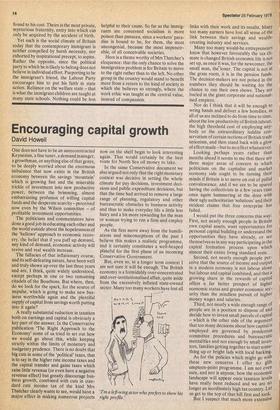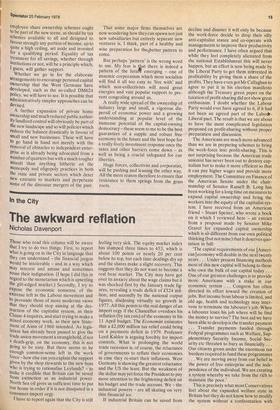Encouraging capital growth
David Howell
One does not have to be an unreconstructed Keynesian, a fine tuner, a demand manager, a growthman, or anything else of that genre, to be deeply worried about the enormous imbalance that now exists in the British economy between the savings 'mountain' which is growing fast and the miserable trickle of investment into new productive power, between the brimming, almost embarrassing profusion of willing capital funds and the desperate scarcity — perceived now even by the Wilson committee — of profitable investment opportunities.
The politicians and commentators have done a good job in educating each other and the world outside about the hopelessness of the 'bellows' approach to economic recovery, the belief that if you puff up demand, any kind of demand, economic activity will revive and real wealth increase.
The fallacies of that inflationary course, and its self-defeating nature, have been well and truly shown up over the last three years and are, I think, quite widely understood, except perhaps in one or two remaining citadels of the Bourbons. But where, then, do we look for the spark, for the source of impulse, which is going to make new bus iness worthwhile again and the plentiful supply of capital from savings worth putting into it again?
A really substantial reduction in taxation both on earnings and capital is obviously a key part of the answer. In the Conservative publication 'The Right Approach to the Economy' some of us tried to set out how we would go about this, while keeping strictly within the limits of monetary and budgetary prudence. There is no doubt that big cuts in some of the 'political' taxes, that is to say in the higher rate income taxes and the capital transfer and gains taxes which raise little revenue (or even have a negative revenue effect) but greatly discourage bus iness growth, combined with cuts in standard rate income tax of the kind Mrs Thatcher clearly wants to see, would have a major effect in making numerous projects now on the shelf begin to look interesting again. That would certainly be the best route for North Sea oil money to take.
In the same Conservative document we also argued not only that the right monetary context was decisive in setting the whole climate for pay decisions, investment decisions and public expenditure decisions, but that the time had arrived to remove a large range of planning, regulatory and other bureaucratic obstacles to business activity and thus to make everyday life a little less hairy and a bit more rewarding for the man or woman trying to run a firm and employ people.
As the first move away from the humiliations and misconceptions of the past I believe this makes a realistic programme, and it certainly constitutes a well-heaped plateful for the first phase of an incoming Conservative Government.
But, even so, in a longer term context I am not sure it will be enough. The British economy is a formidably over-concentrated and over-institutionalised affair, quite aside from the excessively inflated state-owned sector. Many too many workers have lost all links with their work and its results. Many too many earners have lost all sense of the link between their savings and wealth creating industry and services.
Many too many would-be entrepreneurs know that however favourably the tax climate is changed British economic life is not set up, as once it was, for the newcomer, the small man, the-loner. The capital is not at the grass roots, it is in the pension funds. The decision-makers are not poised in the numbers they should be waiting for the chance to run their own shows. They are buried in the giant corporate and nationalised empires.
Nor do I think that it will be enough to wring hands and deliver a few homilies, as all of us are inclined to do from time to time, about the low productivity of British labour, the high threshold cost of employing anybody or the extraordinary luddite conservatism of certain sections of British trade unionism, and then stand back with a glow of effort made —but to no effect whatsoever.
Looking perhaps years rather than months ahead it seems to me that there are three major areas of concern to which politicians on the capitalist and market economy side ought to be turning their minds if Britain is to move on out of pallid convalescence, and if we are to be spared having the collectivists in a few years time once again hammering at the door with their ugly authoritarian 'solutions' and their strident claims that free enterprise has failed.
I would put the three concerns this way: First, not nearly enough people in Britain own capital assets, want opportunities for personal capital building or understand the opportunities they have already, or see themselves as in any way participating in the capital formation process upon which almost their entire living standard rests.
Second, not nearly enough people perceive that the source of income and output in a modern economy is not labour alone but labour and capital Combined, and that a growing share in the rewards of capital offers a far better prospect of higher
economic status and greater economic security than the mindless pursuit of higher money wages and salaries.
Third, not nearly a wide enough range of people are in a position to dispose of and decide how to invest small parcels of capital
— which is the other side of the argument that too many, decisions abodhow capital Is
employed are governed by ponderoiis
committee procedures and bureaucratic mentalities and not enough by small inves tors, families getting together to start some
thing up or bright lads with local backing. As for the policies which might go with these new concerns I offer no glib umpteen-point programme. I am not even sure, and nor is anyone, how the economic landscape will appear once taxation levels have really been reduced and we are no longer an inordinately high tax country. Let us get to the top of that hill first and look. But I suspect that much more extensive employee share ownership schemes ought to be part of the new scene, as should be tax schemes available to all and designed to favour strongly any portion of income, up to quite a high ceiling, set aside and invested for a qualifying period. Equality of tax treatment for all savings, whether through institutions or not, will be a principle which, I guess, will gather support.
Whether we go in for the elaborate arrangements to encourage personal capital ownership that the West Germans have developed, such as the so-called DM624 Policy, we will have to see. It is possible that administratively simpler approaches can be devised.
A further expansion of private home Ownership and much reduced public authority landlord control will obviously be part of the new landscape and so will policies which redress the balance drastically in favour of small and new businesses. These will have to go hand in hand not merely with the removal of obstacles to independent enterprise as is already being advocated from a number of quarters but with a much tougher assault than anything hitherto on the monopoly and oligopoly practices in both the state and private sectors which deter new entrants to markets and perpetuate some of the dinosaur mergers of the past. That some major firms themselves are now wondering how they can spawn not just new subsidiaries but entirely separate new ventures is, I think, part of a healthy and wise preparation for thetbetter pattern to come.
But perhaps 'pattern' is the wrong word to use. My fear is at there is indeed a pattern of the futulE emerging — one of anaemic corporatism which most socialists will find it all too easy to 'live with' and which non-collectivists will need great energies and vast popular support to prevent congealing around us.
A really wide spread of the ownership of industry large and small, a vigorous dispersal of economic power and a growing understanding at popular level of the immense potential of the capital-owning democracy —these seem to me to be the best guarantees of a supple and robust free economy in the future and the best hope for a really lively investment response once the taxes and other barriers come down — as well as being a crucial safeguard for our liberties.
Huge forces, collectivist and corporatist, will be pushing and leaning the other way. All the more reason therefore to ensure that resistance to them springs from the grass roots.



































 Previous page
Previous page